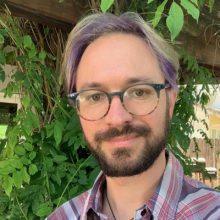Jonathan Beutler
Why did you decide to pursue a graduate degree?
I returned to graduate school in 2019 after ten years working as a commercial grower and agricultural educator in Maui, Hawaii with a focused on niche horticultural crops. I was driven to pursue a research career plant disease biology when my business and primary income stream, a wholesale fresh-root turmeric farm, collapsed as a result of a persistent soil-dwelling bacterial wilt infestation. I first enrolled at UC Davis for a M.Sc. degree in International Agricultural Development with a focus on bacterial wilt pathogens before continuing into a Ph.D. program at UBC focused on the genomics of fungal pathogen/host relationships in cereal crops.
Why did you decide to study at UBC?
First and foremost, I was inspired by the scope of the dissertation project that I am proud to be working on at UBC. I believe that the advent portable sequencing platforms will play an important role in advancing global disease biology by helping us to deploy widespread genomic monitoring for more effective management of pathogen threats than ever before.
What was the best surprise about UBC or life in Vancouver?
Vancouver is a vibrant and amazing city to call home. Unparalleled access to the great outdoors combined with thriving food and cultural scenes, as well as the fairest weather in Canada make it very obvious why the lower mainland is such a desirable place to live.
What aspects of your life or career before now have best prepared you for your UBC graduate program?
In agricultural research, there is often a wide gap between the scientific research and on-the-ground needs of farmers in the field. Working as a professional grower for several years before embarking on a research career has helped me in countless ways. A foundational understanding of crop production has helped me to design and carry out experiments more effectively, but it has also helped me to ask more targeted and relevant research questions to deliver measurable and material improvements to the agricultural industries we serve.
What do you like to do for fun or relaxation?
When I am not in the lab, I am usually hiking with my dog Butters (an 11 year-old papillon), snowboarding in the North Shore mountains, or perfecting new recipes in the kitchen.
What advice do you have for new graduate students?
Choosing the right graduate program is a very important decision. Ask a lot of questions before committing to any one program. Ask to meet with current students in the program as well as interviewing with the lead professor. Learn as much as you can about the project you will be working on as well as the culture of the lab or program you will be working in. Find what sort of research questions are the most inspiring for you, and make sure that the environment you are working in will provide the infrastructure and educational foundation to keep you driven towards your goals and productively engaging in your research.
